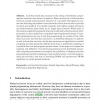Free Online Productivity Tools
i2Speak
i2Symbol
i2OCR
iTex2Img
iWeb2Print
iWeb2Shot
i2Type
iPdf2Split
iPdf2Merge
i2Bopomofo
i2Arabic
i2Style
i2Image
i2PDF
iLatex2Rtf
Sci2ools
HIPC
2004
Springer
2004
Springer
Lock-Free Parallel Algorithms: An Experimental Study
Abstract. Lock-free shared data structures in the setting of distributed computing have received a fair amount of attention. Major motivations of lock-free data structures include increasing fault tolerance of a (possibly heterogeneous) system and alleviating the problems associated with critical sections such as priority inversion and deadlock. For parallel computers with tightly-coupled processors and shared memory, these issues are no longer major concerns. While many of the results are applicable especially when the model used is shared memory multiprocessors, no prior studies have considered improving the performance of a parallel implementation by way of lock-free programming. As a matter of fact, often times in practice lock-free data structures in a distributed setting do not perform as well as those that use locks. As the data structures and algorithms for parallel computing are often drastically different from those in distributed computing, it is possible that lock-free prog...
Related Content
| Added | 01 Jul 2010 |
| Updated | 01 Jul 2010 |
| Type | Conference |
| Year | 2004 |
| Where | HIPC |
| Authors | Guojing Cong, David A. Bader |
Comments (0)

